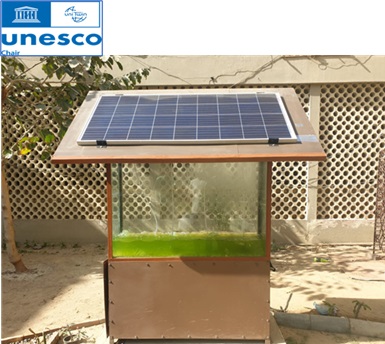|
This research project, initiated by the Department of Environmental Engineering at NED University, aims to contribute to the United Nations Sustainable Development Goals (SDGs)—specifically Goal 7 (Affordable and Clean Energy), Goal 11 (Sustainable Cities and Communities), and Goal 13 (Climate Action). The project explores the use of microalgae for the sequestration of atmospheric carbon dioxide (CO₂) emitted from anthropogenic sources, primarily through the combustion of fossil fuels. This process harnesses the natural photosynthetic abilities of microalgae to capture CO₂, providing a sustainable method for mitigating climate change. Additionally, microalgae biomass offers a promising source of biofuels, including oil for environmentally friendly biofuel production, as well as carbohydrates and proteins for value-added products.
The growing urbanization and reliance on fossil fuels in cities have exacerbated air pollution, leading to significant public health concerns. Urban flat-panel photobioreactors (PBRs) have emerged as an innovative and cost-effective solution to address these challenges, offering a means to reduce greenhouse gas (GHG) emissions and improve urban air quality. Microalgae grown in these systems exhibit biomass productivity rates and lipid/protein content yields significantly higher than terrestrial crops, making them a more efficient alternative for carbon capture and biofuel production.
Preliminary findings indicate that indigenous neem trees (Azadirachta indica), a widely available plant species, demonstrate a carbon sequestration capacity of approximately 0.082 kg of CO₂ per year. In comparison, a 250-liter urban photobioreactor can mitigate up to 0.38 kg of CO₂ annually—equivalent to the CO₂ absorption capacity of 5 mature neem trees. Furthermore, microalgae in photobioreactors have been shown to capture carbon dioxide at a rate 10 to 50 times greater than that of terrestrial plants. These results highlight the potential of microalgal systems to significantly reduce urban CO₂ emissions while simultaneously contributing to the development of sustainable biofuels. This study underscores the importance of integrating urban-scale photobioreactor systems into sustainable city planning, offering both environmental and economic benefits through enhanced carbon capture and the production of renewable energy resources.
|

